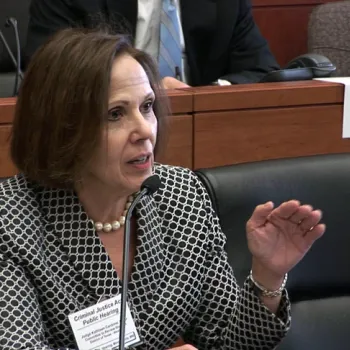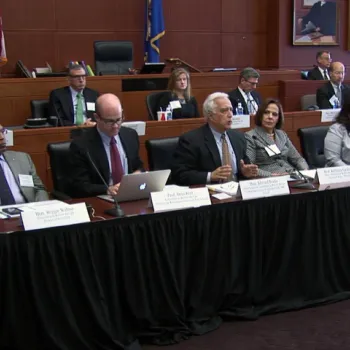A special committee conducting a comprehensive review of the nation’s federal system of indigent defense has wrapped up a series of seven hearings around the country. The sessions featured more than 100 hours of public testimony from federal defenders, panel attorneys, judges, prosecutors, advocacy groups and academics.
The Ad Hoc Committee to Review the Criminal Justice Act (CJA) Program will spend the next several months analyzing the written and oral testimony it received before drafting its recommendations. It expects to issue its report by April 2017. The two-year study is the first comprehensive look at the federal public defense system in over 20 years. Members of the committee were appointed by Chief Justice John G. Roberts, Jr.
“With approximately 90 percent of all federal criminal defendants in this country found to be indigent, the enormity and importance of this study cannot be overstated,” said Judge Kathleen Cardone, of the Western District of Texas, who chairs the committee. “Aware that our system of federal indigent defense is held up as a model around the world, the committee takes its charge most seriously. I am honored to chair a committee comprised of such dedicated and concerned individuals.”
The wide array of issues covered in the hearings included the administration of the defender system by judges, the adequacy of attorney compensation, billing and voucher review, diversity efforts, and the quality of CJA representation. Extensive written testimony and video of the public hearings are readily available on the committee’s website.
One of the major issues that emerged from the hearings is judicial oversight of the CJA program. Currently, chief federal public defenders are appointed by the court of appeals for a circuit, and CJA panel attorneys – court-appointed private attorneys – are often selected and paid by the courts where they serve. The Defender Services Office is part of the Administrative Office of the U.S. Courts. Some attorneys testified that an inherent conflict of interest in the system makes it difficult for them to provide zealous representation to their clients.
“Defenders should not be hired and retained by the circuit who hears their cases,” testified Melody Brannon, a federal public defender in Kansas. “When I receive an unfavorable ruling from the court, the thought of whether this will influence their decision to retain me is unavoidable.”
Some federal judges described the present system as well-functioning despite scattered issues that exist in individual districts. Chief Judge Petrese B. Tucker, of the Eastern District of Pennsylvania, said that while underfunding of the program remains a problem, “the current system works well and keeps its expenditures moderate, particularly in view of the large number of criminal matters” the district handles.
Another issue at the hearings was compensation for panel attorneys and payments for services necessary for an adequate defense, which can vary widely from one district to the next and from one judge to the next. “The government routinely staffs complex cases with two prosecutors, two special agents, a paralegal, a victim/witness coordinator and other agents and analysts from law enforcement,” said panel attorney Lynn E. Panagakos of Honolulu, whereas she is often limited in the number of hours of outside expertise she can retain to help defend her clients.
The problem has been exacerbated by the advent of large data dumps generated by digital communications, including emails, cell phone records and social media traffic. Debra A. Dilorio, a former federal defender-turned-panel attorney in San Diego, said that in one “mega-case” she is currently working on, “the discovery consists of hundreds of thousands of pages of loan documents, over 100 hours of audiotaped interviews and 40,000 pages of emails. The paper discovery alone filled 24 bankers’ boxes … Some (judges) will approve expenses for paralegals, investigators and experts, and some will not.”
“In any event,” she said, “the CJA lawyer faces the Herculean, virtually impossible job of trying to review and assimilate the evidence while maintaining a relationship with the client.”
The relatively new challenges of e-discovery take a disproportionate toll on public defenders because of wide disparities in resources compared with government lawyers, such as in money, personnel and training, testified Sean Broderick, the National Litigation Support Administrator in the Defender Services Office.
Attorneys and judges both spoke favorably about the increasing use of case “budgeting” and case budgeting attorneys, who work with the defense attorneys to estimate and review proposed budgets for individual cases, while also making adjustments in funding when a case takes unforeseen turns. Robert J. Ranz, a case budgeting attorney in Cincinnati, said, “The attorneys and the judges have embraced the new culture of trying to be cost-efficient without sacrificing quality,” he said. “… The climate of the government attorneys having seemingly unlimited resources will perhaps never change, but we attempt to keep the playing field as level as possible.”
CJA Hearing Transcripts
Transcripts and videos are available of the public hearings.
The ad hoc committee is composed of federal judges, defense attorneys, a federal court employee, a former federal prosecutor, and a law professor. Public hearings were held in Santa Fe, N.M.; Miami, Fla.; Portland, Ore.; San Francisco, Calif.; Birmingham, Ala.; Philadelphia, Penn; and Minneapolis, Minn.
The last comprehensive look at the CJA program was led by Judge Edward C. Prado, of the U.S. Court of Appeals for the Fifth Circuit, who is advising the current committee. The Prado Committee produced its findings in 1993. The Judicial Conference accepted many of its recommendations, including comparable pay for employees in federal defender and U.S. attorney offices, the mandatory creation of federal defender offices in any district that met certain caseload levels, and fair and reasonable compensation for panel attorneys.
The Criminal Justice Act was passed in 1964 to create a system to provide defense services to financially eligible criminal defendants. The vast majority of criminal defendants cannot afford to hire attorneys themselves and are represented by court-appointed counsel.
Subscribe to News Updates
Subscribe to be notified when the news section is updated.


